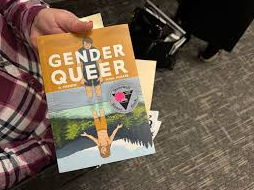
Court Rejects Effort to Label ‘Gender Queer’ and ‘A Court of Mist and Fury’ as Obscene for Minors
A Virginia judge has ruled against a lawsuit that sought to categorise two books as obscene for children, blocking an effort to prevent their distribution to minors in bookstores and libraries. The case involved the books Gender Queer: A Memoir by Maia Kobabe and A Court of Mist and Fury by Sarah J. Maas, both of which contain sexual content. The lawsuit, filed by Tommy Altman, a Virginia Beach tattoo shop owner and former Republican congressional candidate, argued that the content was inappropriate for minors under Virginia’s obscenity laws. Altman requested a court order to halt the sale or loan of these books to children.
Circuit Court Judge Pamela S. Baskervill dismissed the lawsuit on jurisdictional grounds, stating that Virginia law did not grant her the authority to rule on the obscenity of these books for minors. She also cited constitutional concerns, emphasising that restricting the distribution of the books would constitute “prior restraint” on free speech, which is protected under the First Amendment. Additionally, the judge expressed concerns about the difficulty of prosecuting individuals who unknowingly distributed what might later be considered obscene material.
The lawsuit had been part of a wider national trend, as book challenges and bans have surged across the United States. Virginia, in particular, has been at the forefront of these debates, with Governor Glenn Youngkin’s campaign focusing on curtailing discussions around topics such as sexuality and gender identity in schools. Gender Queer, which was removed from Virginia Beach school libraries earlier this year, has been a focal point in these discussions.
Altman’s attorney, Tim Anderson, clarified that the lawsuit was not about banning LGBTQ+ or trans literature but rather about the explicit sexual content in the books, which they argued was unsuitable for young readers. Anderson also stated that the goal was to change Virginia’s obscenity law, which currently applies the same criteria to both minors and adults. Altman sought a legal distinction specifically addressing what is deemed obscene for children.












